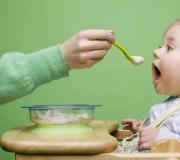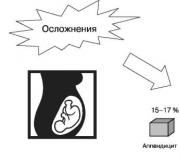Working with parents on environmental education of preschoolers. Questionnaire for parents "Environmental education of children Questionnaire for parents ecological education of children
Details Nature, ecologyPage 2 of 6
Attachment 1. Questionnaire for parents "Environmental education of children"
FULL NAME___________________________________________
Age group________________________________
1. Do you know what ecology is, what it studies, what it does? ______________________________________________________
2. Do you know that a preschool institution is deeply involved in the issues of environmental education of children? _________________________________
3. Are you personally interested in this problem?________________________
4. Do you feel from the child that in preschool a lot of attention is paid to environmental education? ___________________________________
How is it shown?
- The child talks a lot, asks to have an animal, a plant at home, pays attention to the nature around him, asks to take him to a park, forest, asks to read about nature, etc. (underline as necessary)
5. How do you feel about nature, do you like animals, birds? ________________________________________________________
How can you help the DOE on ecology? ___________________________
6. Do you support the work carried out in the preschool educational institution on the environmental education of preschoolers? _________________________
How is it shown?
- Talked with the child about nature; equipped a corner of nature in the family; purchased animals; feed the birds, get out more often to nature; observe natural objects with children; plant trees, protect nature (underline as appropriate).
7. Do you introduce children to the rules of behavior in nature? _____________
Does it need to be done? ___________________________________________
8. In what way do you need help from the preschool educational institution on this problem? (How to observe the weather; how to keep animals, plants; what knowledge to give; how to introduce the rules of behavior in nature; what practical activities in nature can be done with children ...) __________________
9. How do you evaluate the work of the preschool educational institution on this issue? _________________
10. Your suggestions, wishes. _______________________________
FULL NAME___________________________________________
Age group________________________________
1. Do you know what ecology is, what it studies, what it does? ______________________________________________________
2. Do you know that a preschool institution is deeply involved in the issues of environmental education of children? _________________________________
3. Are you personally interested in this problem?________________________
4. Do you feel for your child that the educational institution pays a lot of attention to environmental education? ___________________________________
How is it shown?
- The child tells a lot, asks to have an animal, a plant at home, pays attention to the nature around him, asks to take him to a park, forest, asks to respect nature, etc. (underline as necessary)
5. How do you feel about nature, do you like animals, birds? ________________________________________________________
How can you help the educational institution on ecology? ___________________________
6. Do you support the work carried out at the educational institution on the environmental education of preschoolers? _____________________________
How is it shown?
- Talked with the child about nature; equipped a corner of nature in the family; purchased animals; feed the birds, get out more often to nature; observe natural objects with children; plant trees, protect nature (underline as appropriate).
7. Do you introduce children to the rules of behavior in nature? _____________
Does it need to be done? ___________________________________________
8. In what way do you need the MA's help on this issue? (How to observe the weather; how to keep animals, plants; what knowledge to give; how to introduce the rules of behavior in nature; what practical activities in nature can be done with children ...) __________________
9. How do you evaluate the work of the educational institution on this issue? _________________
10. Your suggestions, wishes. _______________________________
Questionnaires for parents:
"Environmental education in the family"
The purpose of the survey: to reveal the attitude of parents to the issues of environmental education of preschoolers in kindergarten and its real implementation in the family.
1. Do you have pets at home? (Cat, fish, dog, hamster, etc.)
2. Are there indoor plants? Which?
3. Who takes care of the animals or plants?
4. What does the child do at the same time (feeds, walks with him, plays, waters or does nothing)? - Underline or add.
5. Do you and your child go out in nature? If yes, where?
6. For what purpose?
7. Where does the child usually spend the summer?
8. How do you feel about introducing a child to nature in kindergarten?
9. Your suggestions on the organization of environmental education in kindergarten.
"The air in our apartment"
1. Determine the condition of the air in your apartment:
a) clean
b) dirty
c) don't know
2. Are you satisfied with the air quality in your apartment?
3. Name possible sources of air pollution in your home.
4. How many indoor plants do you have?
5. How often do you ventilate the room:
a) regularly
b) occasionally
c) I don't care
6. How often do you do wet cleaning:
a) every day
b) once a week on weekends
c) other options...
7. Did you take into account the environmental safety of materials when purchasing:
a) furniture Yes No
b) wallpaper Yes No
c) carpets Yes No
8. What household chemicals do you use?
9. How do you clean the air in the apartment?
"Ecology and smoking"
1. How many members of your family smoke?
2. Does it happen that your child is in a smoky room?
3. If you don't smoke, do you consider it dangerous for you to be around someone who smokes?
4. If you are a non-smoker, do you prefer to leave a room with smokers?
5. Do I think that smoking exacerbates the impact of adverse environmental conditions on people's health?
APPENDIX 2
1. Secrets of nature
(parent meeting-KVN)
There are two teams involved:"Droplet", "Planet Earth".
Jury: head of educational institution, parents.
Leading: teacher.
Proceedings of the meeting
Leading. Nature is our wealth, it is our task and duty to preserve this wealth for future generations. Man is part of this nature.
Think about the content of Mikhail Prishvin's appeal to us: “Fish needs clean water - we will protect our reservoirs. Various valuable animals live in forests and mountains - we will protect our forests, steppes, mountains. Fish - water, the beast - the forest, steppes, mountains. And a man needs a home. And to protect nature means to protect the Motherland.
D e in and from our collection: "Touch nature with your heart."
The facilitator analyzes the exhibition of drawings and handicrafts from natural material made by parents and children, and analyzes the questionnaires.
th competition. Performance.
Each team with the chosen name must present itself - 3 points.
th competition. Warm up.
Questions for the "Kapelka" team:
What tree sap is sweet? (Birch, maple.)
Which trees have red leaves in autumn? (Rowan, maple.)
- What kind of forest animal:
The beast is afraid of my branches,
Birds will not build nests in them.
In the branches - my beauty and power.
Tell me quickly, who am I? (Elk.)
I sing loudly
Returning from the south on time.
But I take songs
Even - even forty. (Starling.)
- What birds do not build nests, but hatch chicks in the sand, a hole? (Seagulls, waders.)
- What forest plants can replace meat? (Mushrooms are porcini and champignons are the most nutritious.)
What herbaceous plant blooms first? When? (The mother and stepmother, in April.)
Questions for the Planet Earth team:
What wood are matches made of? (Aspen.)
- What tree is said about: “Green, not a meadow, white, not snow, curly, but without hair?” (Birch.)
- Guess what kind of bird:
Afraid of bright light.
Crochet beak, piglet eyes
Eared head. It… (owl).
He slept in a fur coat all winter,
He sucked his gray paw,
And waking up, he began to roar,
This is a forest animal... (bear).
- Who is cuckooing at the cuckoo? (Male.)
What mushrooms appear first? (Moles.)
- Why do birds not peck at a bright ladybug? (Emits a caustic liquid.)
Musical pause: dance "Rainbow".
th competition. Live pantomime.
Each team shows a live pantomime, the other team must guess (3 objects of nature).
Ecological education of the younger generation is one of the important problems of modern society. Often we think about the ecological situation on earth, in the classroom we educate students about respect for nature, but we don’t think about how the parents of our pupils relate to environmental problems. Questionnaire for parents on ecology will help to deal with this problem.
View document content
"Questionnaire for parents on ecology"
Questionnaire for parents on ecology
1. What is ecology?
2. Do you have indoor plants, and which ones? If not, why not?
3. Does the family have a dog, cat or other animals?
4. Have you planted a tree?
5. Have you ever made bird feeders?
6. Do you read books about nature to your child?
7. Does your child watch filmstrips, slides, TV shows about
8. Does your child like to be in the forest?
9. Do you often go to the forest with your child?
10. Does your child know the names of trees, flowers, berries, etc.?
11. Do you tell your child about the benefits of trees, medicinal herbs, berries, insects, birds?
12. Does your child know poems, riddles, sayings, proverbs about nature?
13. Does your child show caring attitude towards animals and plants?
14. How do you think your child will get knowledge about nature in kindergarten?
Questionnaires for parents
"Environmental education in the family"
The purpose of the survey: to reveal the attitude of parents to the issues of environmental education of preschoolers in kindergarten and its real implementation in the family.
1. Do you have pets at home? (Cat, fish, dog, hamster, etc.)
2. Are there indoor plants? Which?
3. Who takes care of the animals or plants?
4. What does the child do at the same time (feeds, walks with him, plays, waters or does nothing)? - Underline or add.
5. Do you and your child go out in nature? If yes, where?
6. For what purpose?
7. Where does the child usually spend the summer?
8. How do you feel about introducing a child to nature in kindergarten?
9. Your suggestions on the organization of environmental education in kindergarten.
Questionnaire for parents
“How competent are you in environmental matters?”
Do you consider it necessary to acquaint children with the nature of our city?
Do you think that there are environmental problems in our city? Which?
In your opinion, do you have enough information about the nature of our city to answer the questions that a child has?
How often do you go on field trips with your child?
Do you think your child is familiar with the rules of behavior in nature? And you?
What activities would you suggest to hold on environmental topics in a group or for the city?
Do you think there are problems with household waste in our city? Which?
Olga Alexandrovna Ryabtseva
Questionnaire for parents "Environmental education of preschoolers"
Questionnaire for parents
« Ecological education of preschoolers in"
Dear parents!
We would like to know your opinion about the work of the kindergarten, educators, teacher of additional education with children on environmental education.
C the purpose of the questioning: reveal attitude parents to the issues of environmental education of preschoolers in kindergarten and its implementation in the family.
1. Do you consider an important component ecological education of preschoolers?
Yes No Don't know
2. How do you understand what is ecology What does she study, what does she do?
3.. Do you consider it necessary to acquaint children with the nature of our region (urban district, village?
Yes No Don't know
4. In your opinion, do you have enough information about the nature of our region (urban district, township) to answer the child's questions?
Yes No Don't know
5. In your opinion, does the state of a child's health depend on the state of the environment?
Yes No Don't know
6. What joint activities do you carry out environmental education of children in the family?
Conversations with children about nature
Bird feeding
Rest at nature
Observation of natural objects
Reading fiction of natural history content
Other forms___
7. How do you rate the level ecological your child's knowledge?
High Medium Low
8. Do you introduce children to the rules of behavior in nature?
Yes How? ___
9. What information would you like to receive from preschool institution for environmental education of preschoolers ___
10. What activities would you suggest to hold on environmental topics in the group(kindergarten?___
11.. How do you rate the work preschool institution for environmental education of preschoolers? ___
Natalya Kotlyar
Questionnaire for parents "Environmental education in the family". Questionnaire analysis
QUESTIONNAIRE FOR PARENTS
«»
The purpose of the questioning: reveal attitude family.
1. Do you have pets at home?
2. Are there indoor plants? Which?
3. Who takes care of the animals or plants?
4. What does the child do at the same time (feeds, walks with him, plays, waters or does nothing? (underline or add)
5. Do you and your child go out in nature? If yes, where?
b. For what purpose?
7. Where does the child usually spend the summer?
8. How do you feel about introducing a child to nature in kindergarten?
9. Your suggestions for organization:
"Air in your apartment"
1. Determine the condition of the air in your apartment:
a) clean;
b) dirty;
c) I don't know.
2. Are you satisfied with the air quality in your apartment? Not really
3. Name possible sources of air pollution in your home.
4. How many indoor plants do you have?
5. How often do you ventilate room:
a) regularly;
b) occasionally;
c) not pay attention to it.
6. How often do you wet cleaning:
a) every day
b) once a week on weekends;
c) other options.
7. Have you considered ecological material safety at buying:
a) furniture - Yes / No;
b) wallpaper - Yes / No;
c) carpets - Yes / No.
8. What household chemicals do you use?
8. How do you clean the air in the apartment?
« Ecology and smoking»
1. How many people are in your family smoke?
2. Does it happen that your child is in a smoky room?
3. If you don't smoke, do you consider it dangerous to be around someone who smokes?
4. If you are a non-smoker, do you prefer to leave a room with smokers?
5. I believe that smoking exacerbates the impact of adverse ecological health conditions?
« Ecological education in the family»
In the period from 20 to 23 April parents were given a questionnaire.« Ecological education in the family» .
The purpose of the questioning was: relationship detection parents to the issues of environmental education preschoolers in kindergarten and its real implementation in family.
AT 14 out of 20 parents took part in the survey.
To the first question - 1. Do you have animals at home? (Cat, fish, dog, hamster, etc.) the following responses were received.
AT 7 families not pets.
AT 6 families have either cats or dogs.
For the second question - 2. Are there indoor plants? Which? the following responses were received.
11 families have indoor plants.
Three families do not.
For the third and fourth questions - 3. Who cares for animals or plants? the following responses were received.
In 13 families, animals or houseplants are cared for as parents as well as children (feeds, walks with him, plays, waters).
1 family is not cared for because there are no plants or animals in the house.
For the fifth and sixth questions - 5. Do you and your child go out in nature? If yes, where? 6. For what purpose? the following responses were received.
Such places of rest were announced how: forest, sea, dacha, bay, river, lake, fishing, ravine, ocean, volcanoes.
For the seventh question - 7. Where does the child usually spend the summer? the following responses were received.
For the eighth question. 8. How do you feel about introducing a child to nature in kindergarten? the following responses were received.
For the ninth question. 9. Your suggestions for organization environmental education in kindergarten received the following responses.
Green up the garden area
Departure of children to different places of outdoor recreation
Organization of a living corner
Make a birdhouse or bird feeder
Continue further work on environmental education
Plant flowers, trees, Water, weed, care.
Watching films and m\movies about the protection of nature, animals, insects.
The study of literature.
Related publications:
Questionnaire for parents "What is the place of physical culture in your family?""What is the place of physical culture in your family?" Dear parents, please answer? to the following questions. 1. Does attend.
Questionnaire for parents "What place does physical education and sports take in your family?" Dear parents! We ask you to take part in a study of the influence of the lifestyle of children in the family on the child's ideas about health, physical education, etc.
Questionnaire for parents to study the social situation of the child's development in the family Questionnaire Dear parents! We ask you to answer the questionnaire in order to study the social situation of the child's development in the family. 1. Consider.
Questionnaire for parents "Environmental education in the family and preschool" Dear parents! We ask you to take part in the survey on the environmental education of preschool children. Name ___ Age group.
Questionnaire for parents "Economic education of the child in the family" Questionnaire for parents economic education of a child in the family Purpose: to involve parents in joint work on economic education.
Questionnaire for parents on the organization of theatrical activities in the family Questionnaire for parents Dear parents! We are very interested in the successful development of your child and creating the necessary conditions for development.




